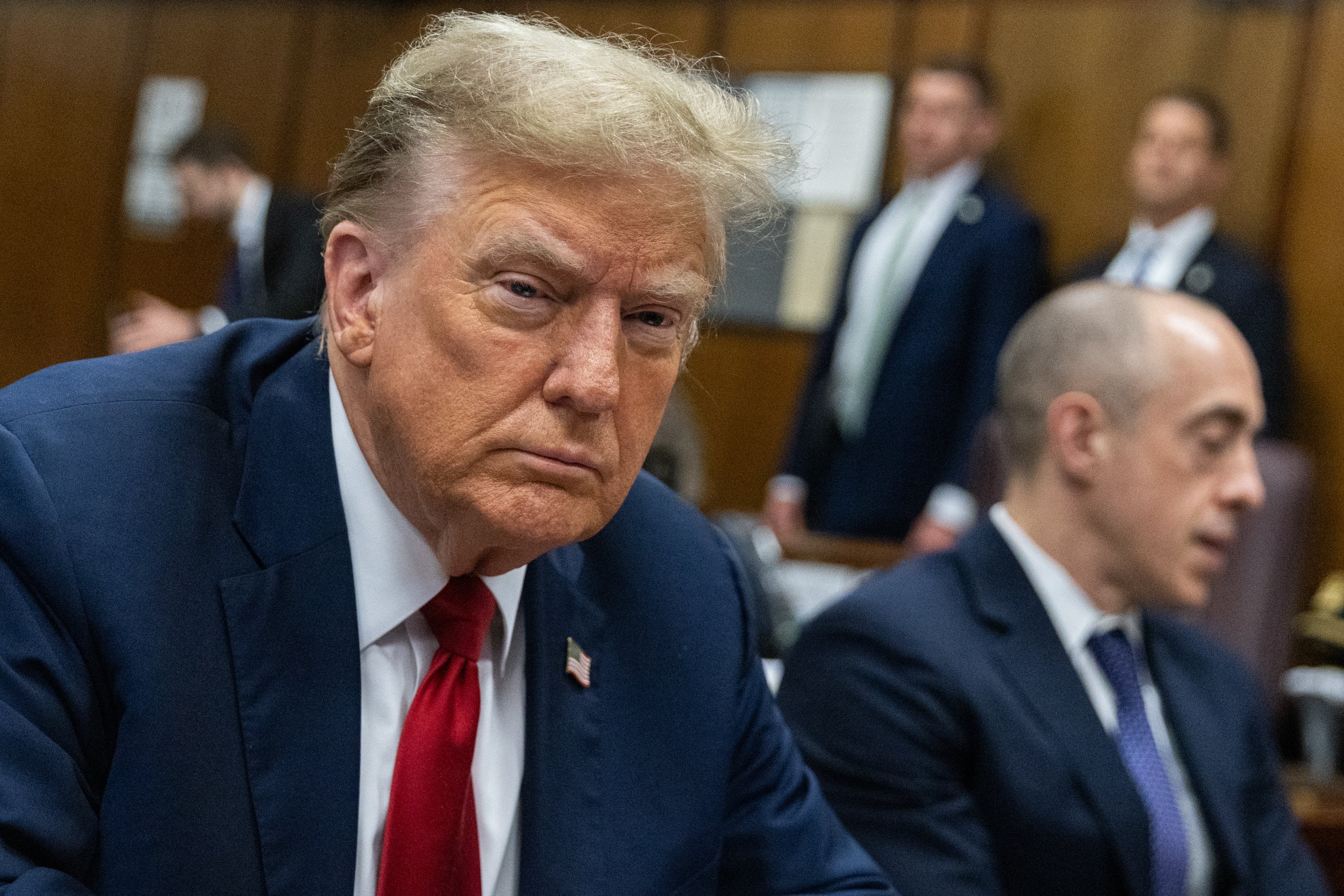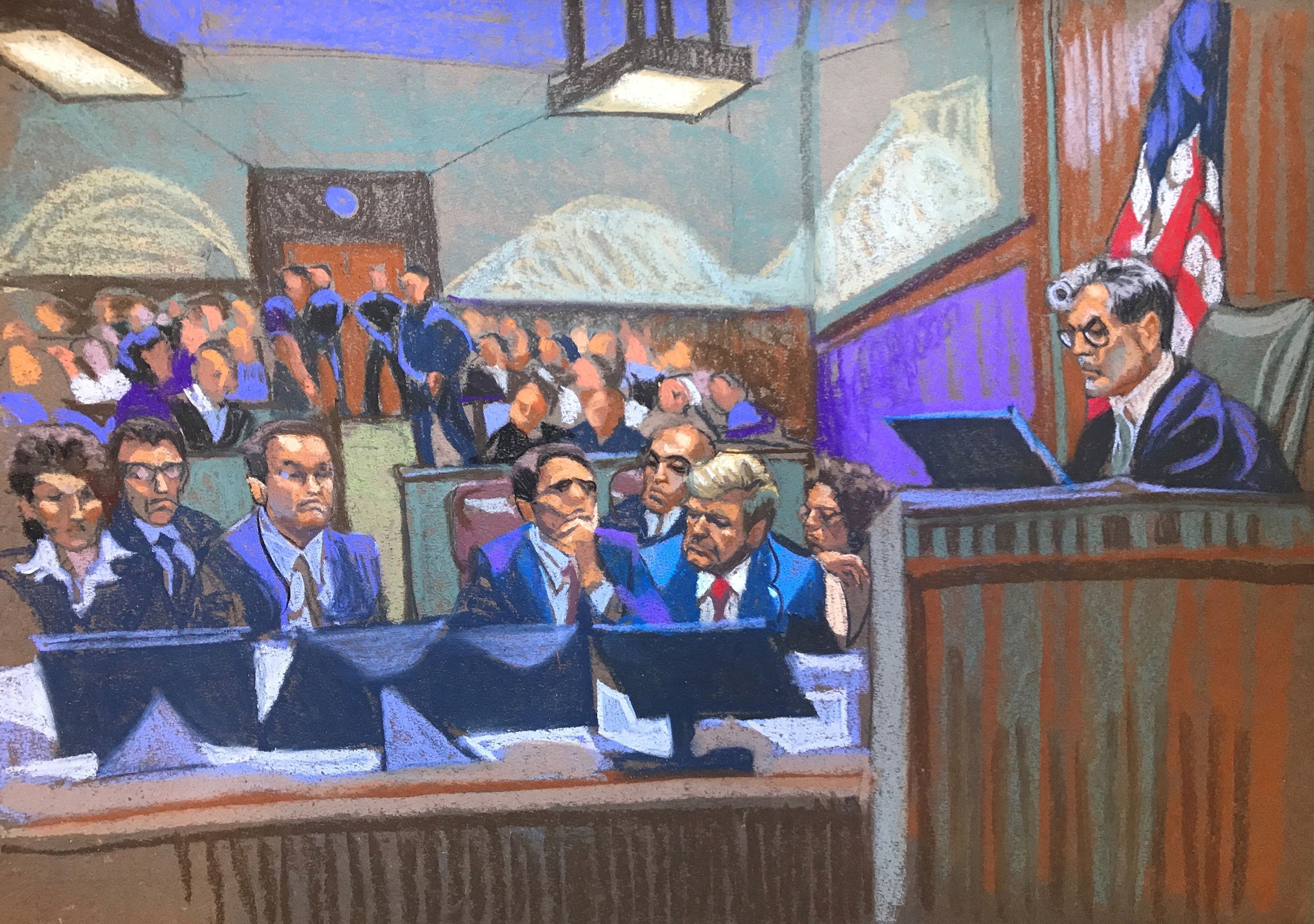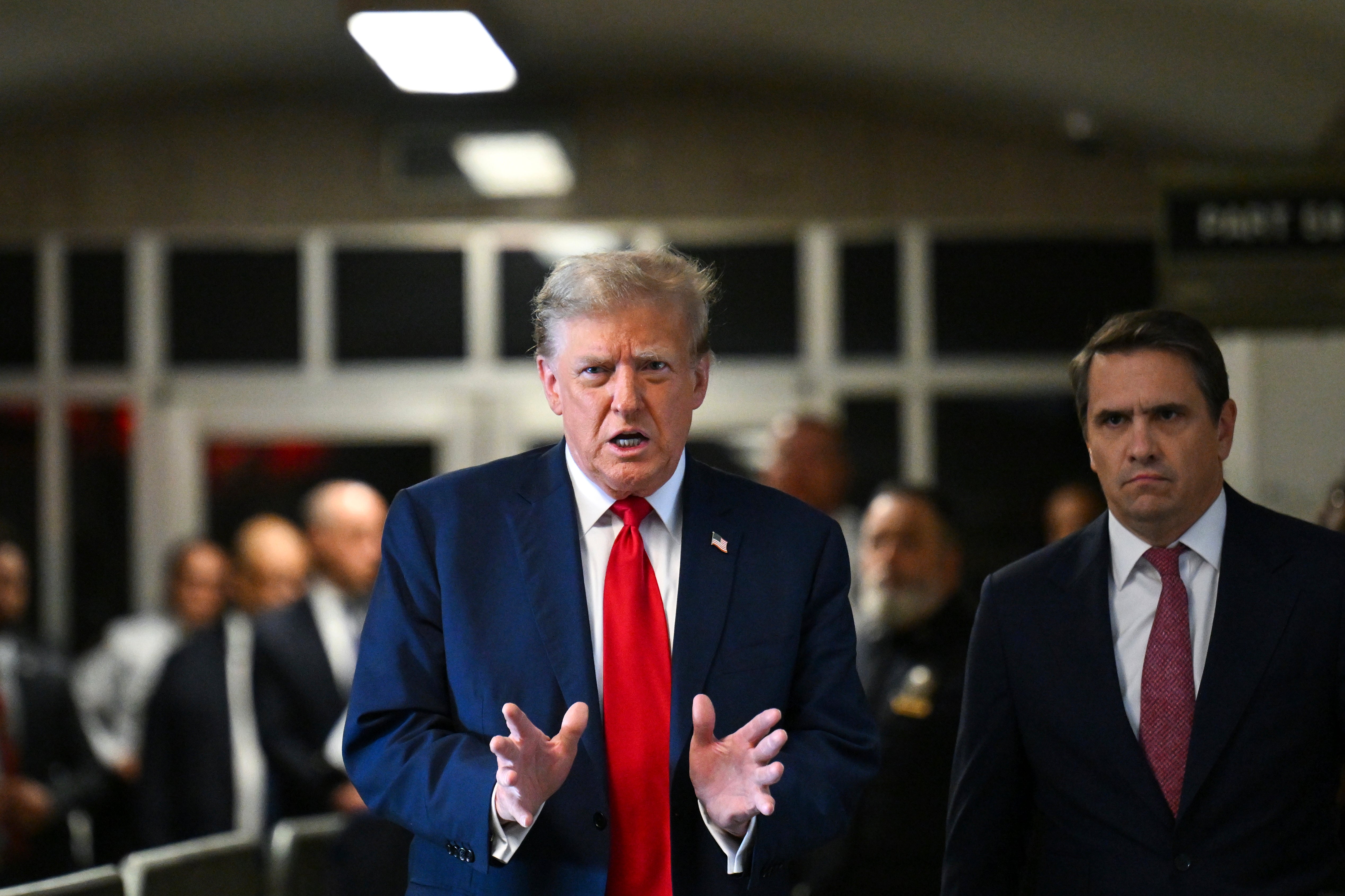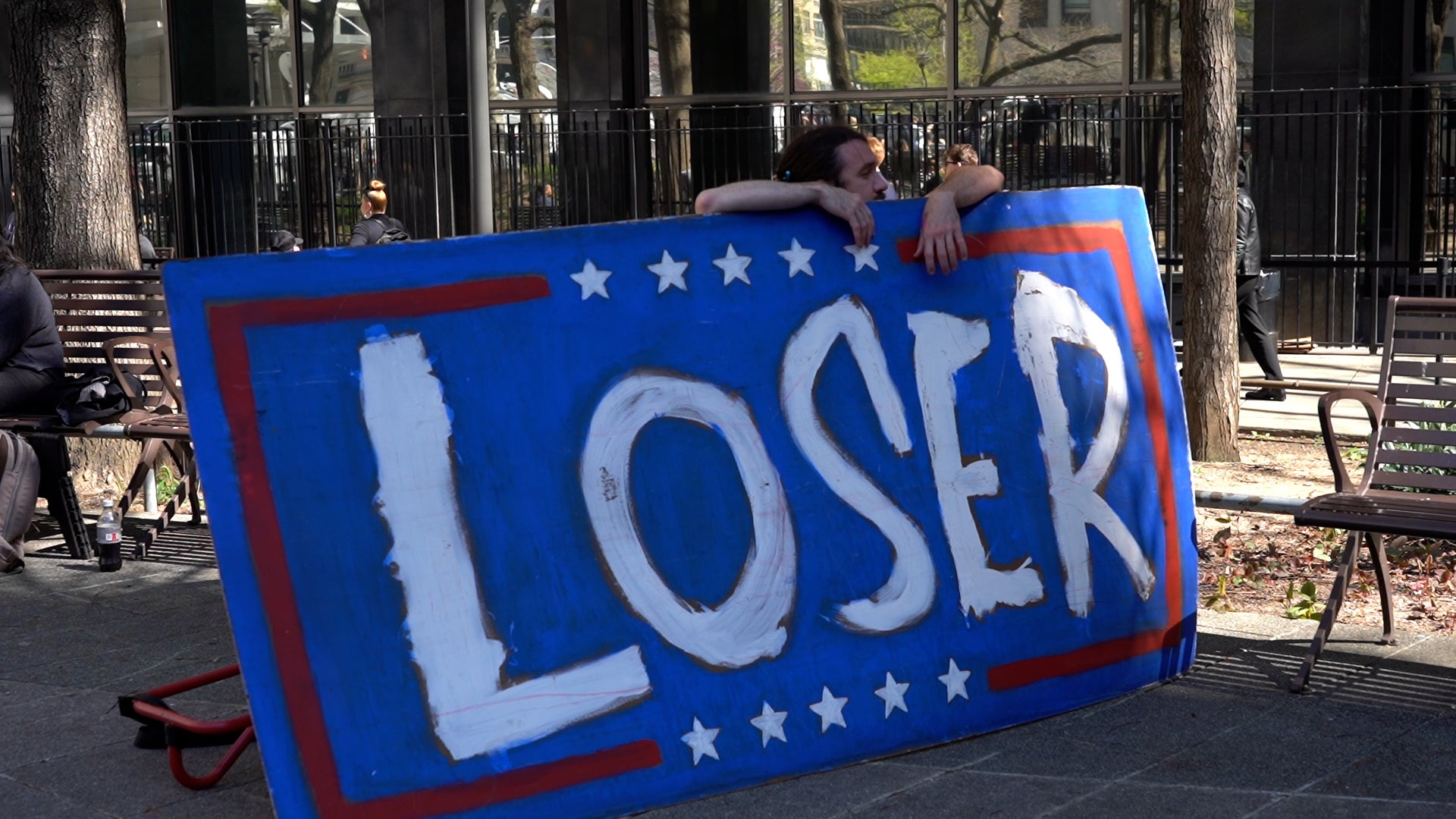Trump’s first day on criminal trial: ‘Sleepy Don,’ Truth Social rants and 50 would-be jurors excused
An exhausted Trump doesn’t want to be there and is trying desperately to avoid it. He can’t, and the next two months will be torture for the man who could soon become president once again. Alex Woodward reports from Manhattan criminal court


Your support helps us to tell the story
From reproductive rights to climate change to Big Tech, The Independent is on the ground when the story is developing. Whether it's investigating the financials of Elon Musk's pro-Trump PAC or producing our latest documentary, 'The A Word', which shines a light on the American women fighting for reproductive rights, we know how important it is to parse out the facts from the messaging.
At such a critical moment in US history, we need reporters on the ground. Your donation allows us to keep sending journalists to speak to both sides of the story.
The Independent is trusted by Americans across the entire political spectrum. And unlike many other quality news outlets, we choose not to lock Americans out of our reporting and analysis with paywalls. We believe quality journalism should be available to everyone, paid for by those who can afford it.
Your support makes all the difference.When he entered a Manhattan courthouse for the first day of his first criminal trial, Donald Trump’s Truth Social account fired off more than a dozen posts slamming the case and attacking the witnesses expected to testify against him.
He staged an impromptu press conference in the hallway outside the doors of the courtroom, turning to a group of cameras to blast the proceedings as “an assault on America”. When he left for the day, he called it a “political witch hunt”.
Inside, beforeThe People of New York v Donald J Trump got under way, he sat by himself for a moment, clasped his fingers together, and stared at the empty bench before him. He would later slouch down in the red chair at the defence table beside his attorneys, with the shoulders of his navy suit jacket bunched around him as he appeared to doze off.
Even as the judge was reading instructions to the group of men and women who could decide whether he’s running for office as a convicted felon, Mr Trump appeared to nod off, prompting a wave of “Sleepy Don” and “Don Snorleone” memes on social media.
Moments later, more than half of those prospective jurors were excused from the case after telling the judge that they could not deliver a fair and impartial verdict against the former president.
Mr Trump is facing 34 felony charges of falsifying business records in connection to an alleged “hush money” scheme to bury compromising stories of his alleged affairs. Prosecutors have argued that the case is one involving an election interference plot to deceive voters in the weeks before the 2016 presidential election.
His then-attorney Michael Cohen paid adult film star Stormy Daniels $130,000 to keep quiet about an alleged affair, according to prosecutors. Mr Trump then allegedly reimbursed his “fixer” in a series of payments fraudulently listed as “legal expenses”.
The case from Manhattan District Attorney Alvin Bragg predates the charges against him in a pair of criminal cases targeting his attempts to reverse his loss in 2020, but prosecutors tie the hush money scheme to a years-long MO to dupe voters in an election year, in a case that’s likely the only one of his four criminal cases to head to trial before the next election this November.
Mr Trump has repeatedly tried and failed to stop the trial from happening at all, losing several 11th-hour arguments to delay or dismiss the charges against him last week.
On Monday, as he was forced to sit in court as a criminal defendant on the first day of his trial, he was staring down the prospect of up to four years in state prison, if convicted.
While this may be his first criminal trial, Mr Trump’s appearance inside New York County Supreme Court was not unlike his behaviour at his other court hearings within the last year. He often crosses his arms and scrunches his shoulders, whispers to attorneys, or stares at nothing in particular, even in the face of jail time and thousands of dollars in fines for his ongoing violations of gag orders against him.
Unlike his two civil trials, criminal defendant Mr Trump – the presumptive Republican nominee for president – will have to show up to this one, nearly every day, for the next two months.
His only word in court, when asked a series of questions by New York Justice Juan Merchan whether he understands that he could be tossed out for bad behaviour, was a simple “yes”.
Before the judge adjourned for the day, Mr Trump’s legal team asked if he could slip out of the trial next week so he can attend a US Supreme Court hearing on his claim of “presidential immunity” to evade charges in his federal election interference case.
“He’s required to be here,” the judge said. “He’s not required to be at the Supreme Court. I will see him here next week.”
Moments later, a fundraising campaign email falsely claimed he “stormed” out of the courthouse. Mr Trump was, instead, standing with his attorneys before trudging down the hall.
No jurors selected yet
After a first batch of jurors were sworn into a 15th floor courtroom, roughly 50 out of 100 were sent almost immediately back out. None believed they could remain “fair and impartial” in one of the biggest criminal cases in American history.
Those who remained in the courtroom were pulled out at random into a jury box. Under the trial rules, the names and identities of the prospective jurors are protected, and a gag order blocks parties from attacking them, along with witnesses and other parties in the case.

Eleven people – each reading from a list of 42 questions – were surveyed. None have yet been formally selected to serve.
They included a midtown-based creative director, two attorneys, marketing professionals, an “outdoorsy” Irishman who lives in Harlem, and an oncology nurse.
A bookseller who works with a paediatric cancer organisation answered “yes” to a question about whether jurors have “any feelings or opinions about how Mr Trump is being treated in this case”.
“Nobody is above the law,” he replied, “whether it’s a former president, a sitting president, or a janitor.”
Another prospective juror who lives in Harlem was excused after answering “yes” to the following question: “Do you have any strong opinions or firmly held beliefs about former President Donald Trump, or the fact that he is a current candidate for president that would interfere with your ability to be a fair and impartial juror?”
For his part, Mr Trump was following along, reading from the questionnaire as each juror went through the survey. He held up the paper close to his face, tilting his head back to read it.
Access Hollywood tape comes into play
Earlier this year, the judge ruled that the now-infamous 2005 Access Hollywood tape would not be played to jurors. But, on Monday, he clarified that prosecutors will be able to “bring out what was said” on the tape during trial in the form of a transcript.
An email thread about the comments on the tape “demonstrates and bolsters the People’s claim that this was a … critical event, and there was a response within the campaign,” he added.

Assistant District Attorney Joshua Steinglass had argued that “excluding the actual words used” and hearing what that tape was about and why it had such a “dramatic impact on the campaign” is misleading to jurors.
He read part of the transcript of Mr Trump’s comments on the tape to the court.
“I’m automatically attracted to beautiful – I just start kissing them. It’s like a magnet. Just kiss. I don’t even wait,” Mr Trump said.
“And when you’re a star, they let you do it. You can do anything. Grab them by the p****. You can do anything.”
‘Catch and kill’ scheme
The judge also allowed evidence that prosecutors argue will paint a fuller picture of the so-called “catch and kill” scheme used to buy up damaging stories about Mr Trump to protect his 2016 presidential campaign.
David Pecker – whose American Media Inc publishes the notorious American supermarket tabloid National Enquirer – would “serve as the eyes and the ears of the campaign” and “gather information that would be harmful to the Trump candidacy and report to Michael Cohen … to prevent that information from ever seeing the light of day,” according to Mr Steinglass.
That agreement also included a plan to “publish positive stories about Trump and negative stories of his opponents”.
Prosecutors want to admit, among other stories, National Enquirer headlines that were “timed perfectly to achieve maximum effect,” including one about Mr Trump’s former Republican rival Marco Rubio that accused him of abusing drugs, according to Mr Steinglass.
“All three components of the Trump Tower agreement were made with boosting Trump’s candidacy” and “put their thumbs on the scale,” Mr Steinglass said.
Mr Trump’s lead attorney Todd Blanche pushed back, arguing that “it happens in candidacies all over this country”.

“This has nothing to do with the charged conduct … It becomes a side show,” he said.
Judge Merchan sided with prosecutors, saying that the state had established that “there was this understanding – I want to stay away from the word ‘conspiracy’ that wasn’t charged in this case … in furtherance of this goal” at the heart of the case.
Understanding that is “necessary to complete the narrative of what took place,” he added.
Karen McDougal allegations
Prosecutors also wanted to introduce additional evidence involving Mr Trump’s alleged affair with former Playboy model Karen McDougal, and to underscore to jurors that Melania Trump was pregnant at the time of her husband’s alleged infidelity.
Judge Merchan ruled that prosecutors can discuss the allegations of the affair but instructed them to leave out mention of the former First Lady.
Mr Steinglass said prosecutors have “no intent to elicit salacious details of the affair … unless the defendant opens the door,” but the fact she was pregnant lends credence to the idea that the release of the story would be damaging to Mr Trump’s campaign, and reveals the “lengthy they would go to suppress it,” he said.
“The only value would be to embarrass President Trump,” Mr Blanche said in response.
“The risk of unfair prejudice is through the roof,” he added. “It has nothing to do with the trial. He’s not charged with this conduct.”
The “interjection” of Ms McDougal’s story into this trial creates a “side trial we can’t do anything about,” he said. “It’s literally just salacious without value.”
Gag order violations
Mr Trump’s Truth Social rants were also brought up inside the courtroom on Monday.
Manhattan prosecutors asked Judge Merchan to fine the former president $1,000 each for a series of social media posts that they argued violated a trial gag order which banned Mr Trump from publicly attacking witnesses in the case.
Prosecutors requested that the judge impose at least $3,000 in fines, order Mr Trump to remove the posts from his Truth Social, and issue a warning to him that any further violations could result in jail time.
Mr Trump’s defence attorney Todd Blanche called the posts “limited responses to a barrage of attacks”.
“It’s not as if President Trump is going out and targeting individuals. He’s responding to salacious, repeated, vehement attacks,” he said.
Judge Merchan will hear arguments on the charge on 23 April.
Earlier on Monday, prosecutors warned that Mr Trump was using his platform “to influence the work of the grand jury”.
The trial jury should be able to consider “his very public statements” seen “as attempts to intimidate witnesses to stay quiet,” Mr Steinglass added. “This effort continues to this very day.”
His ongoing comments about trial witnesses are a “blatant violation of the court order about extrajudicial statements,” the gag order in the case, according to Mr Steinglass.
The posts have “incurred the wrath” of the former president’s supporters, he said.
Subscribe to Independent Premium to bookmark this article
Want to bookmark your favourite articles and stories to read or reference later? Start your Independent Premium subscription today.